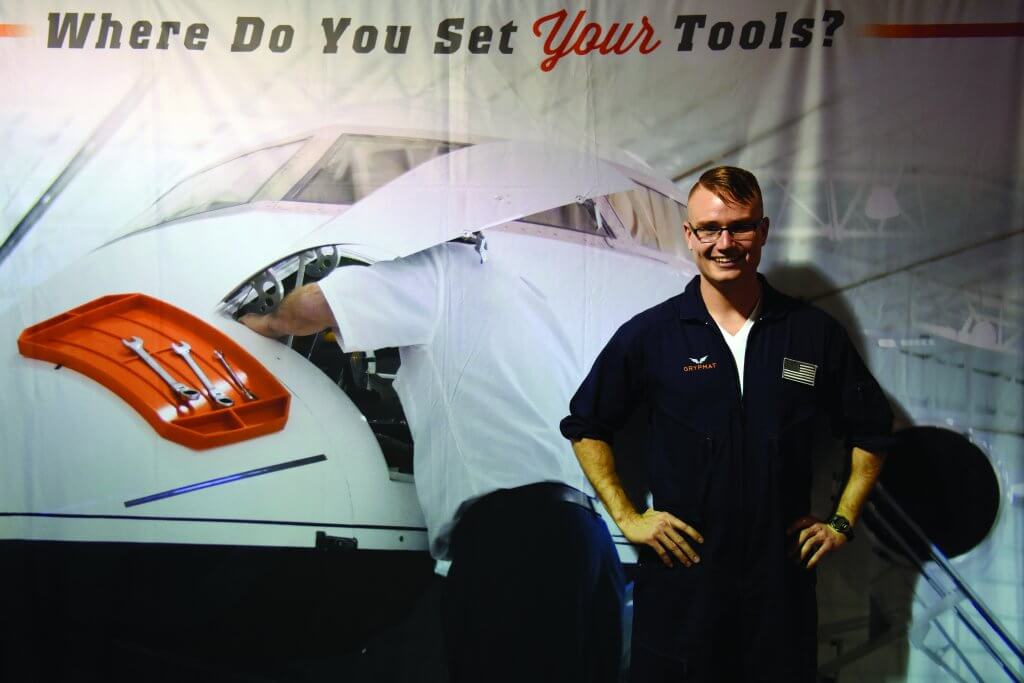In 2013, Tom Burden discovered the problem of ineffective tool accessibility while working as an F-16 Weapons Mechanic in the Air Force as a member of the Ohio Air National Guard.
After almost falling off an F-16 while trying to retrieve a tool sliding off the curved surface of the jet, Burden knew there had to be a better way to keep the tools he needed nearby and secure while he worked. An idea came to him while he was sitting in his mom’s car and he noticed she had a non-slip mat on the dashboard to hold her cell phone. The problem was that he needed a similar product large enough to hold tools used by aircraft mechanics on steep angles or curved surfaces, non-static for use around sensitive electronics, and resistant to corrosive chemicals used in aircraft maintenance.
Burden decided that this was a problem worth solving and began prototyping and iterating in his basement until finally building a product that, not only, solved his problem, but also improved his experience as a mechanic. Thus, the Grypmat was born.
Since founding Grypmat, Burden used his National Guard education benefits to earn his bachelor’s degree in mechanical engineering from the University of Toledo. He built a team around him, and moved his venture from his hometown of Celina, Ohio, to the growing city of Columbus, Ohio. Burden separated from the service earlier this year after a total of nine years in the Air Force, to devote his full attention to his growing company.
The Grypmat has grown into the industries of aviation, automotive, and recently, medical and has been used by companies such as Google, NASA and Virgin Orbit.
To date, Burden has raised over $700,000 for Grypmat through various grants and awards, a 300%-funded Kickstarter campaign, and a Shark Tank appearance that resulted in a combo deal with Mark Cuban, Lori Greiner, and Sir Richard Branson.
Burden has come a long way from prototyping in basements and sleeping in attics, but what remains the same is his dedication to building products that solve problems, and his belief that when you commit to serving others — anything is possible.
AmeriForce recently caught up with this busy entrepreneur and asked him about starting and growing his business while still in the military.
How did being a member of the Air National Guard help you design, create and market your product?
It really put me in the position of feeling the pain point so I could fully understand the problem and envision the solution. If I hadn’t been in the Air Force, I wouldn’t have discovered the problem.
What were some of the challenges you faced once you came up with your idea for the Grypmat?
Every step is very difficult, from prototyping, manufacturing, raising money to selling the product. I’ll never say that no one believed in Grypmat, people did along the journey…a lot of people did, but the biggest struggle was me believing in myself. Building a company is an everyday effort. The challenges never end, so even after turning an idea into a profitable company, I still have to remember to believe in myself.
What do you consider to be your “big break,” and how has it affected your life?
Biggest “break” I would say is Shark Tank.
Since the show has a bit of a “halo effect”, being on Shark Tank helped to get people excited and in the conversation. From negotiations to customer relations, Shark Tank adds credibility. It has definitely helped deals go through.
Any advice I would give is that there is no “big break”, there are “breaks” — but don’t think that one break means you have to stop working.
I believe that your biggest accomplishment should be the one that you’re currently working on…day in and day out.
Owning a company doesn’t get easier — you just get better at being scrappy.
Where do you go from here?
My mission is to create more products that are going to make processes faster and better in every industry. I want to help make our military the most efficient military on the planet.
What advice do you have for other would-be entrepreneurs serving in the reserve component?
When there are days where everything goes wrong typically means that there are days around the corner where everything will go right.
Having a startup is like joining the military, you have fully committed yourself to something that you don’t really know exactly what you signed up for or what to expect until you experience it. Stay committed and resilient and you will succeed.
Being in the military is an amazing networking point. Everyone knows someone who is in the service, it’s easy for people to relate and it’s widely respected. People typically love hearing anything about the military, any details that you can legally provide are always welcomed by others (do be smart about it and keep the military in a good light).

